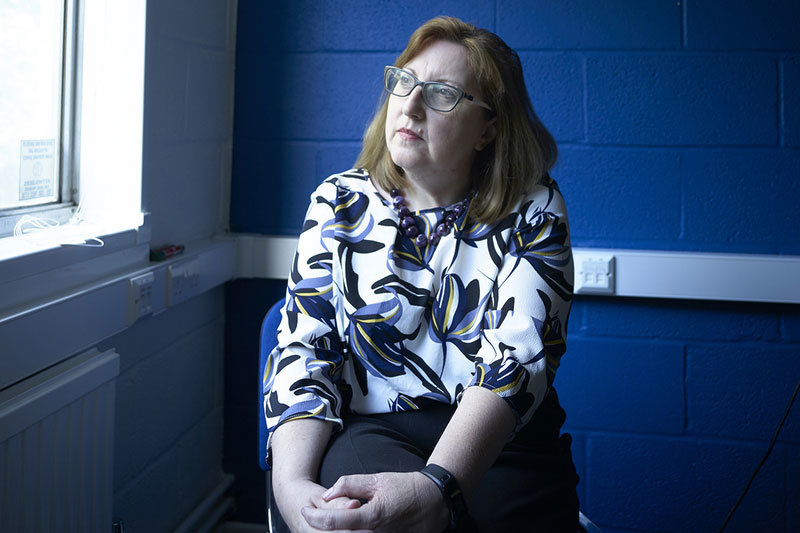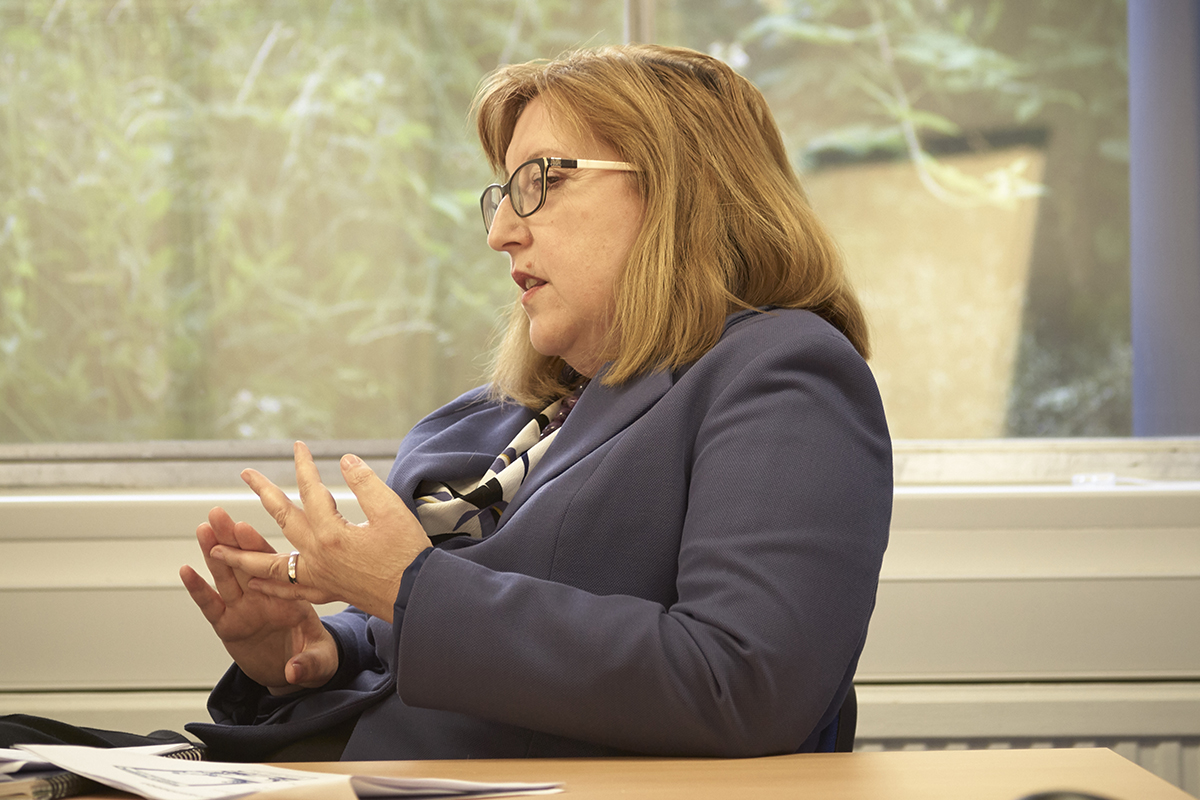You are viewing 1 of your 1 free articles
From ombudsman to women’s pioneer
Why is a specialist housing association for women needed? Danielle Aumord meets the new chief executive of Women’s Pioneer Housing, Denise Fowler, to find out
“You asked me whether I identify with the women here and the short version is ‘yes’,” says Denise Fowler, the newly appointed chief executive of Women’s Pioneer Housing (WPH).
Her voice wavers as she shares the longer version. As a baby, Ms Fowler lived with her parents in a caravan on a petrol station forecourt, and had moved 13 times by the age of 11. She faced homelessness again at the age of 19. “I’ve got first-hand experience of the difficulties, if you are a woman without many resources, of finding housing in London,” says Ms Fowler, who grew up – and still lives – in south-east London.
Before starting at WPH last month, after the retirement of Janet Davies, Ms Fowler worked as the Housing Ombudsman for nearly two-and-a-half years, resolving disputes between landlords and residents. She also worked in the Department for Communities and Local Government as deputy legal director, head of planning law reform.
Along with Housing for Women, WPH, which manages more than 900 homes, is one of just two British housing associations where only women can be lead tenants for social housing tenancies. It was formed in 1920, when suffragettes raised cash to buy large homes in Notting Hill for women of modest means. The association, which now has homes across west London and Middlesex, still owns four properties in Ladbroke Gardens where its founder, Etheldred Browning, purchased the first house for £2.
So what is Denise Fowler’s vision for WPH? To find out, Inside Housing has come to meet her at the association’s head office near White City.
Empowering women
Ms Fowler is a lawyer by training, and this shows when she is asked whether female-led tenancies are still important in 2017. She is firm in her answer.
“It’s important because women are disadvantaged in the housing market,” she says. “On average, they earn 85% of what men do; in some sectors the gap is significantly higher. If women have control over their tenancies and their homes, it gives them greater control over their lives and greater confidence to go forward.”
“If women can control their tenancies, they have greater control over their lives.”
Aside from the fact that it is smaller than most associations and its core business comes from female social housing tenants, WPH is a typical city-based housing organisation, and faces equally typical problems. Staff receive complaints of anti-social behaviour, although Ms Fowler emphasises that WPH has a “strong group of tenants”.
But for Ms Fowler, WPH’s fundamental purpose is to advance gender equality, and she is keen to refer back to its original aims of empowering women. “We’re not a campaigning organisation, but I think that the core of our business [being] tenancies held by women sends a very strong message,” she says.
She looks thoughtful, and adds: “It’s early days yet but I’d like to discuss with the board offering intermediate tenancies for women who earn a little more but still can’t afford to live in London and would never get a council nomination.”
WPH takes referrals from local councils, hostels, community organisations and its own two waiting lists for single women aged over 35 and 45. Last year it gave out 48 social housing tenancies, including transfers.
When we meet, it is Ms Fowler’s eighth day in her new role, and the afternoon after the fire at Grenfell Tower – just five minutes’ drive from WPH’s head office. The association has 781 homes in the Royal Borough of Kensington and Chelsea, and it is busy trying to provide victims with temporary accommodation. One family is placed overnight in a guest room at Stanley Gardens, a sheltered housing project for women aged 60 and over.
“We’re looking at our voids to see about temporary housing for displaced people,” explains Ms Fowler. “We might have to flex our women-led housing policy on a short-term basis because this is such an extraordinary thing.” She later confirms that this did happen.
She says she will explain to tenants what the association has done, noting that they have been affected by the tragedy, with family members who are missing and presumed dead, or displaced as a result of the fire. In the aftermath of the fire, WPH, which does not have any tower blocks, is reviewing its safety procedures and equipment and taking steps to reassure concerned tenants.
This communicative approach reflects the sort of relationship Ms Fowler intends to foster with her tenants, and she plans to collaborate with the board, staff and residents. “The residents have lots of skills and expertise,” she says. “I’m willing to use this and build on it.”
She earned a reputation for being a champion of tenant engagement as Housing Ombudsman, and seems keen to continue in the same vein.
She wanted to “move on from advising other people to actually doing it” herself on the frontline, and felt the WPH job was too good an opportunity to miss.
The association already has a scrutiny panel – made up of volunteer tenants, a residents’ association and a social club – and it is high on Ms Fowler’s agenda to set up a process whereby the housing association can review whether the panel’s recommendations have been put into effect. It would then report back to tenants on the progress made.
The residents’ association has been challenging WPH on service charges for nearly two years. Members recently learned that recommendations from the scrutiny panel – such as shorter handling times for complaints, and that monies overspent on service charges in previous years should be paid back in credit to tenants – are being implemented. As a result – and because of the 1% reduction in social housing rents set by the government – some tenants will pay up to £40 less per month, taking into account both rent and service charges.
The residents’ association hopes to make further improvements to the tenants’ situation by working closely with Ms Fowler. Its new chair, Lizzie Spring, a retired voluntary sector senior manager, is cautiously optimistic about the new CEO. “She has a good reputation for enabling positive change, so she seems exactly the [type of] person we hoped would take the post,” says Ms Spring. “Improving relationships between the CEO and the residents’ association will really help WPH deliver a modern version of its original mission to enable single women on modest incomes to live dignified, independent, productive lives in attractive, affordable homes.”
There has been some discontent among the association’s social housing tenants about the five properties it lets on the open market. To this, Ms Fowler has a matter-of-fact response. “I think we’ll continue [with the properties for market rent],” she says. “I don’t think it will become a massive proportion of our business because the core of that remains social housing, but it needs to be an element of the finances in order to keep our other rents low and to allow us to develop more housing for women.” She says the association has plans for “quite significant growth” but details are not yet agreed.
Feminist roots
Ms Spring’s chief concern about the market lets is that lower-floor flats could have been assigned to women with access needs, but are instead rented privately to able-bodied tenants. “Although I agree with a few private lets, I think they should be prioritising current tenants’ needs over making profits to expand,” she comments.
With the new chief executive in place, tenants are also hoping for the right to choose whether they have to deal with a male or female member of staff, for further service charge disputes to be resolved, and for upgrades of kitchens and bathrooms that are in a particularly bad condition.
As well as planning to be a listening chief executive, Ms Fowler is an avid reader. She excitably shares her experience of hearing Laura Bates, author of Everyday Sexism, speak at Hay Festival and it is clear that this type of feminist literature has influenced her approach to life, including housing. She seems determined to challenge sexism through her new role.
“Gender and equality are absolutely at the heart of the organisation,” she says. “It was a feminist organisation from the start and it remains an organisation that understands how what we do supports and empowers women… through the provision of our housing services.”












